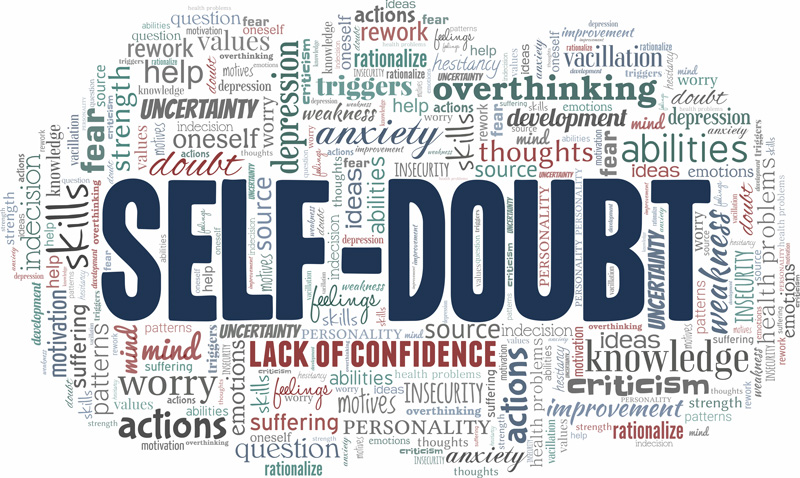Have you ever felt like an imposter in your own life? People who experience this phenomenon express the feeling that they might not be as talented or intelligent as others might believe them to be. They hesitate to credit their experience or problem-solving skills when responding to compliments or positive reinforcement, instead replying with invalidating comments about receiving help from others or “dumb luck.” In addition, the perception that others are surely acutely aware of any shortcomings leads to a fear of being exposed as a fraud (Gadsby & Hohwy, 2023). Unfortunately, feeling like an imposter can contribute to poor self-esteem and low confidence, as well as symptoms of depression and anxiety.

Persistent self-doubt and feelings of inadequacy characterize imposter phenomenon despite external success (Pákozdy et al., 2023). Individuals experiencing imposter phenomenon are prone to cognitive distortions, such as perfectionism, overgeneralization, and catastrophic thinking. The individual reframes these maladaptive thought patterns to serve as motivation to overcome a challenge or prove someone wrong. However, an over-reliance on this strategy might encourage the individual to believe the thoughts and view themselves negatively.
The Cognitive Mechanisms at Play
Symptoms that manifest within an individual experiencing imposter phenomenon are like the maladaptive thoughts and behavior patterns of depression and anxiety. In a recent study by Gadsby and Hohwy (2023), participants were tasked with completing a problem-solving assessment in an online format; those exhibiting high levels of imposter phenomenon were found to underestimate their performance and overestimate other participants’ scores on the task. This tendency for comparative thinking renders the individual incapable of accurate self-perception. The study found that low confidence in their ability to complete tasks affected participants’ motivation to exert effort, causing the participants either to reduce their effort for a task seen as futile – common in individuals experiencing depression – or increase their effort to overcome any perceived shortcomings (Gadsby & Hohwy, 2023), as is common with anxiety.
The Intersection of Imposter Phenomenon, Depression, and Anxiety
The perpetual fear of being exposed as a fraud, coupled with the relentless pursuit of their idea of perfection, drains an individual’s mental and physical well-being. Chronic stress and high cortisol production levels can lead to burnout, characterized by emotional exhaustion, detachment, and a reduced sense of accomplishment. Recovery from burnout often takes several months to a year, and the individual can be susceptible to additional burnout experiences if they are not cautious with their time and energy. As the individual feels the effects of burnout, depressive symptoms may also set in, including low self-esteem, feelings of worthlessness, and diminished interest in previously enjoyed activities. Those who compare themselves to others, especially those perceived to be in positions of higher status or “non-imposters,” are more likely to fuel their depression with a negative self-perception. In turn, these individuals experience high levels of anxiety, which can manifest as general worry or social anxiety. These states, coupled with fear of exposure and anticipation of failure, negatively impact daily functioning.
Normalizing the Imposter Phenomenon
To combat the adverse outcomes of the imposter phenomenon, individuals can engage in awareness and acceptance of these maladaptive thoughts, feelings, and reactions and commit to value-driven actions that align with how the individuals desire to see themselves in the world. Therapeutic interventions, such as acceptance and commitment therapy (ACT), assist individuals by teaching them strategies to acknowledge their thoughts while engaging in behaviors that foster psychological flexibility. Cognitive behavioral therapy (CBT) encourages individuals to reframe their maladaptive thoughts and replace them with more flexible and adaptive cognitions.
Value systems can originate from one’s family of origin, workplace or community organization, or even larger society – and an individual will elevate these values to feel safe within their environment. Imposter phenomenon can be exacerbated by societal change and pressures to succeed. However, the practice of pursuing inclusion and success can lead to an individual viewing themselves as unworthy. An outsourced value system is designed to bring an individual closer to society’s definition of competence or success while further from the ability to self-assess relative to their skill levels and genuine desires.
Conclusion
The impact of imposter syndrome on professionals’ mental health is a multifaceted and complex issue that requires a comprehensive and integrated approach. Understanding the cognitive mechanisms, recognizing contributing factors, and implementing evidence-based strategies for coping and prevention are essential steps in mitigating the harmful effects of imposter syndrome on a person’s well-being. By fostering a supportive professional culture, promoting inclusivity and diversity, and equipping individuals with the tools to address imposter syndrome, society can contribute to creating healthier and more resilient professional environments. As we strive for progress in our workplaces, it is imperative to recognize and address the profound implications of imposter syndrome on professionals’ mental health and work toward a future where individuals can thrive authentically and without the burden of unwarranted self-doubt.
Ashley Zultanky, PsyD, is a Psychologist at Behavior Therapy Associates.
References
Gadsby, S., & Hohwy, J. (2023). Incentivising accuracy reduces bias in the imposter phenomenon. Current Psychology: A Journal for Diverse Perspectives on Diverse Psychological Issues, 42(32), 27865–27873. https://doi-org.kean.idm.oclc.org/10.1007/s12144-022-03878-2
Gadsby, S., & Hohwy, J. (2023). Negative performance evaluation in the imposter phenomenon. Current Psychology: A Journal for Diverse Perspectives on Diverse Psychological Issues. https://doi-org.kean.idm.oclc.org/10.1007/s12144-023-05030-0
Pákozdy, C., Askew, J., Dyer, J., Gately, P., Martin, L., Mavor, K. I., & Brown, G. R. (2023). The imposter phenomenon and its relationship with self-efficacy, perfectionism and happiness in university students. Current Psychology: A Journal for Diverse Perspectives on Diverse Psychological Issues. https://doi-org.kean.idm.oclc.org/10.1007/s12144-023-04672-4








